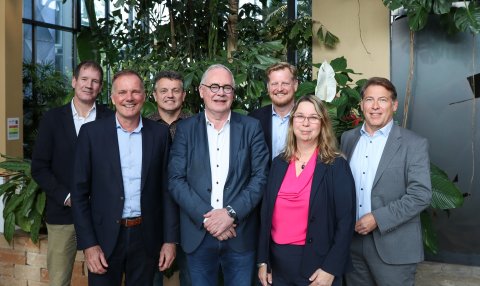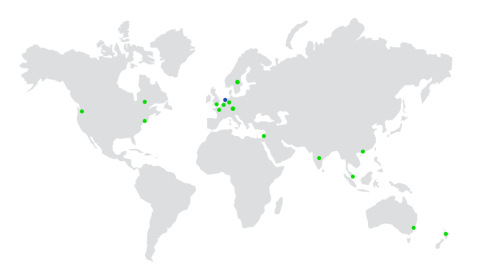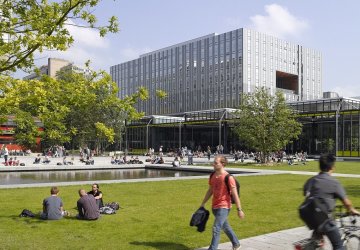
The “smart campus” or “campus of the future” have been topics gaining traction in the last few years within the higher education sector. There is much potential and opportunity here for Real Estate and Facility Managers, but it also comes with its own set of challenges. In this 3-part blog series, I’d like to break down the topic of a “smart campus” and highlight important themes and potential benefits.
In this first blog, I will talk about the evolution of the smart campus toward an intelligent campus and the opportunities this provides for Campus Managers.
Campus management challenges
Campus management leaders are up against many challenges, many of which are influenced by digitization, economics, changing demographics, and innovations in educational models. One of the overarching challenges then becomes how to provide an optimal campus environment at an efficient cost for students, staff, faculty, and the surrounding communities in the face of these influences. There are many innovative technologies and software solutions that higher education institutions have turned to as they work toward finding ways for better planning and execution of campus operations. But when is a campus considered a “smart” campus?
The evolution of the smart campus
Traditionally, a “campus” for a higher education institution is defined as “the buildings and land collectively used for a university or university-related functions.” However, many universities today are working toward delivering something more – a campus that makes them stand out and provides a connected, modern experience for its stakeholders. There is a more holistic approach to managing not only the physical infrastructure – but also the learning infrastructure and the digital infrastructure of a campus.
This fusion of managing the physical and digital infrastructure together is an element that begins to point toward a smart campus. Gartner, Inc. describes it as follows: “The smart campus is a physical or digital environment in which humans and technology-enabled systems interact in increasingly open, connected, coordinated and intelligent ecosystems. Multiple elements, including people, processes, services and things, come together to create a more immersive, interactive and automated experience for students, staff, faculty and stakeholders of a university or college.”
In practice, a campus is mostly already considered smart when certain technology is in place that supports improved decision-making around elements such as space utilization and preventative maintenance processes. Today, smart building technology and IoT initiatives provide new opportunities for campuses to not only collect and store data, but to also analyze that data effectively to make decisions and predictions.
In one of my previous blogs on use cases around smart buildings, I shared that most use cases around smart solutions are still based on an “If This Then That” scenario and a reactive approach rather than a proactive approach. In the example of optimizing space usage; a recognized trend of a decrease in student attendance records for a specific course may lead to the adjustment of the scheduling of the teaching space. But how “smart” is that?
From “smart” campus to “intelligent” campus
In order to incorporate the technologies and shift in strategy that makes up a smart campus, universities must make it a priority to equip their real estate and facility managers with the right tools to manage one. For instance, if an element of a smart campus is the ability to make strategic decisions based on data, the university needs a way to collect, aggregate, and analyze that data. For this reason, many universities are evaluating integrated campus management system solutions that allow them to collect, store, and report on important data around real estate, space, and maintenance processes. True integrated campus management systems also allow data integration with established HR and Finance systems, as well as systems designed around new initiatives in IoT, sustainability and more. Once this integration of data is mastered, a smart campus can even begin to move into an “intelligent” one. With the introduction of elements such as “machine learning,” university professionals can rely on their systems to analyze data to make reliable predictions and decisions based on thousands of scenarios. An example with space usage includes collecting and aggregating real-time data of space planning, historical and real-time data of space usage, historical and actual weather and traffic data, occupancy records, and actual student behavior. Implementing machine learning to this example, reveals an opportunity for more effective communication to students about the use of specific space.
For example, let’s say a classroom space is booked in advance for a specific course for 300 students every Monday at 9:00 AM for 10 weeks. If in the third week, an hour before class, there is a severe weather warning alert, an automatic change to the classroom booked can be made, because based on analysis of the data about the planning, previous usage and attendance, weather data, traffic data and student behavior, it can be reasonably predicted that only ~120 students will show. The immediate change of planning is automatically processed in relevant systems and communicated to all relevant stakeholders. This change immediately contributes to effective usage of space, cost efficiency, and student and staff satisfaction.
This is just one small example of the huge potential of the intelligent campus. If campus managers are capable of determining the right business case and use cases and they are able to get the right smart campus technology in place, they can truly benefit and improve productivity of staff and faculty and achieve great cost reduction. And just as important is the overall experience they can provide to the students, faculty, staff, and campus visitors to improve satisfaction and campus reputation.
Want to learn more? In the next blog I will talk about operating a smart and intelligent campus and the role of campus management systems.





















